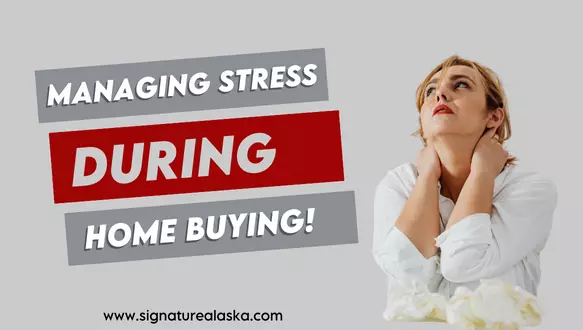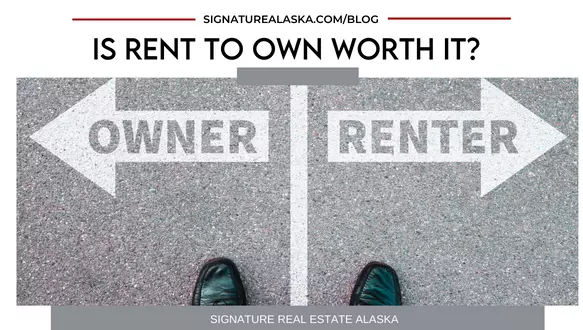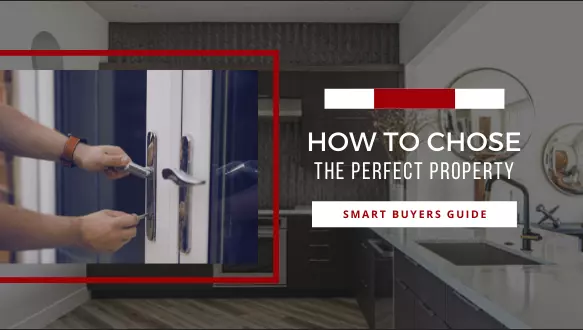
The 5 Biggest Mistakes to Avoid When Buying Your First Home
Buying a home can be an anxiety-ridden process, and that potential anxiety gets amplified for anyone who’s embarking on homeownership for the very first time. There’s so much to do and so much you don’t know that “being overwhelmed” hardly seems like an appropriate description of how it feels. And even though you don’t want to scare yourself away from the entire process, you still need to be wary of falling into a few common traps that first-time buyers generally don’t avoid. If you’re aware of these five potential mistakes -- and able to keep yourself from making them -- then you’ll be saving yourself some significant stress on your home buying journey. Mistake No. 1: Not understanding your down payment options The biggest headache for so many first-time buyers is the down payment. If you’ve ever bought a car, then you’re probably familiar with the concept -- it’s money that you contribute to the total cost of the purchase. A down payment of just a couple thousand dollars can get you a head start on your car. If you don’t have a certain amount to put down on your home loan, however, you might find yourself paying private mortgage insurance (PMI) on the lifetime of the loan. Depending on your credit score, the bank and other factors, PMI could cost between 0.5 percent to 1 percent of the total loan amount. Most banks require at least a 20 percent down payment before they will waive the need for PMI on the loan. And most homes in this area cost about $300,000, so that means a buyer would need to bring $60,000 to the table in order to avoid PMI. However, there are loans that allow you to put as little as 3 percent down on the home ($9,000 for a $300,000 home), which is much more reasonable for a first-time buyer, especially if you can accommodate the annual cost of $1,500 to $3,000 in PMI into your monthly payment amount. And veterans could be eligible for zero-down loan programs with no PMI through the Veterans Administration (VA) loan program, so that’s something else to think about. There’s one more thing to know about down payment options: Some government organizations and lenders try to incentivize first-time homeownership by offering free down payment grants or loans to qualified buyers. Depending on your age, income level, credit score and other factors, you could qualify for free money to wrap into your down payment; a full rundown of programs is available at downpaymentresource.com. Mistake No. 2: Not getting prequalified for a loan Between the amount of money you plan to put down on the home, the potential PMI and other cost factors, your monthly cost could be significantly more (or possibly less) than some of those calculators will show you online. So before you trust those “estimated monthly mortgage loan amount” numbers that you see popping up next to your potential new dream home on Realtor.com, Zillow or a brokerage website, it pays to figure out what you can actually afford -- and that means getting prequalified for a home loan. This means you will need to talk to a mortgage loan officer and submit a slew of documentation, from your monthly pay stub to your credit score, in order for that loan officer to tell you how much money you can get for your home loan. It’s a little bit painful, but the prequalification letter you’ll get as a result is much more credible than a quick qualification you can pull up on an app -- and that means sellers will take it more seriously when it comes time to put in an offer. You’ll have to qualify for a loan eventually anyway, so why not get the painful part out of the way? Be careful: A bank might approve you for a loan amount that’s realistically more debt than you can carry month-to-month. Consider that you’ll need to pay homeowners’ insurance, taxes and possibly flood insurance on your new property or PMI on your loan, and try to make sure you’re not setting yourself up for a total monthly payment that’s more than about one-third of your household’s take-home pay. Not only will this help you set your price range for the search stage, but it will also give you confidence that you -- yes, you! -- can be a successful homeowner someday soon. Mistake No. 3: Not finding a qualified real estate professional It’s so easy to find homes online these days that you may wonder why a real estate professional is even necessary. After all, isn’t the hard part -- finding the place you want to buy -- something you can do yourself? Well, maybe. But the process of buying and selling a home is filled with 100’s of details that need to be planned for and navigated to a successful outcome. Not to mention areas with competitive markets where you’re probably not seeing the most updated listings -- that home you just fell in love with online might be under contract before you can set up a time to tour it. Not only can a real estate professional make sure you have access to listings the second they hit the MLS, but a licensed real estate professional can also provide expertise on the area where you want to move. Whether that’s feedback on who can help you with homeowners’ insurance quotes to warnings about some of the challenges of owning a home in that particular area, you want to work with an honest professional dedicated to protecting your interests and those of the public. A real estate professional is an invaluable resource. Here are some questions to ask any real estate professional you’re interviewing: How long have you sold real estate? How long have you sold real estate in this neighborhood in particular? What can you tell me about the energy options in the area? What else should I know about utilities, like water/sewer and other amenities? What do other clients who have moved here like about the area? What don’t they like? What do people in this area like to do for fun? What are some popular weekend activities? What can I expect about the buying process? What steps should I be especially aware of, and how will we stay in communication? A real estate professional who’s an area expert should have no trouble answering the lifestyle questions, and a real estate professional who’s a transaction-management ace can help you understand exactly what you’re in for, how long it’s likely to take and what rewards await you at the end of the tunnel. Mistake No. 4: Not spending the night in the neighborhood If it’s at all possible, see if you can find an Airbnb or another vacation-rental type of setup where you can crash for a night or two -- preferably closer to a week -- so you can try your new neighborhood on for size. Is an 8 a.m. arrival time at work still reasonable with this neighborhood’s commute? This is an opportunity for you to start navigating your way around public transportation or new routes to work so you know exactly what you’re signing up for. Where are the closest grocery stores, parks, rec centers and hiking trails? Figure out where you’re going to shop and work out, and where you can spend time outside walking the dog or enjoying nature. That way you won’t kick yourself later for realizing too late that something you really value isn’t available. And what are the overnight noise levels like, anyway? If there’s a train that rolls through town in the early hours of the morning, you’re near a highway or a flight path -- and any of that is going to disturb you -- then it’s best to figure it out before you’re spending your first night in your new home and wake up to unpleasant (and unexpected) noises. At the very least, you can learn enough about the neighborhood to know how close to (or far away from) the bus line you need or want to be and target your home search accordingly. Mistake No. 5: Not understanding what’s fixable and what’s a deal-breaker Those drop panels in the ceiling are hideous, and you can’t imagine how anyone can fit into that minuscule bathtub. Are those annoyances that can be fixed or deal-breakers that mean you should pass on the property entirely? This is another area where a good real estate agent can help. They see so many houses in various stages of repair and updating that they can show you where you can claim another foot or two for bathtub space (and help you figure out how much it will cost and who’s trustworthy enough to take on the job) or let you know that the ceilings are too low for any changes to make much of a difference. They can also give you an idea of what’s up to code and what simply won’t pass an inspection in 2017, so you know what concessions to request as soon as you’re ready to make an offer. In markets where entry-level homes are getting snatched up as soon as they hit the market, knowing what’s acceptable and what you just can’t take is a huge advantage -- it’ll help you make a decision, with confidence, on the fly. None of these mistakes will keep you from buying a home of your own -- but they could delay the process and cost you hundreds (if not thousands) of dollars at the end of the day. But if you’re able to avoid them, you’ll be signing the closing papers on your dream home before you know it!

Why Working With a Real Estate Professional is the Best Decision You'll Ever Make
Most people don’t buy a home every day -- it’s a once-or-twice-a-decade activity for many of us as opposed to a day-in-day-out activity. So when you start getting serious about buying, whether it’s your first home or your fourth, it’s easy to feel overwhelmed pretty quickly. Some parts of the process (like searching for a home) have recently become more accessible through technology, but when every buyer has access to the same technology and resources, it’s tough to stand out in a crowd of showing, bids and contracts. And there’s a lot more to the journey than just finding the home: You need to figure out financing, negotiate on price and possibly request repairs or make concessions, get the home appraised and inspected, and make sure all the i’s are dotted and t’s are crossed by the time you sit down at the closing table to sign your name on a stack of paperwork. That’s why a real estate professional can be an indispensable resource for buyers -- unlike most of us, real estate professionals do manage home sale transactions every day, and they can serve as a guide on the buyer’s journey, ushering you from Base Camp “I Think I Want To Buy A House” to Summit the mountain of “I’m A Homeowner,” step by step. Here are just a few of the ways a real estate professional can help smooth your home buying path. Getting pre-approved by a lender Instead of paying rent to the owner of your residence every month, as a homeowner, you’ll be paying back a bank for the money you borrowed to buy your own place. But before you get there, you need to find that bank and secure that loan. Where do you start that process? A real estate professional is one good place -- agents work with an array of local loan officers representing different lenders, and depending on whether you’re a veteran, your down payment size, your credit score, and a number of other factors, a good local agent will know which lender (and loan officer) might be the best fit for you. The right loan officer will explain your financing options and help you drill down to the real nitty-gritty, like the size of the monthly mortgage payment that’s affordable on your current income, what you should expect in terms of closing costs, and whether the down payment amount you’ve saved is going to cut it. Agents can also explain what to expect during the mortgage loan application process, what you should know about transferring money during the sale, why it’s important to review certain documents -- and they can usually even attest to whether certain lenders have parameters that might be better for one type of home instead of another. Choosing a home Many buyers (mistakenly) think that they don’t need an agent’s help finding a home. They know what they want, and they know how to search the internet -- what’s the point of hiring an agent? Here’s the thing: You might not need any assistance when you’re picking out a car, but there is no consumer report that exists for the specific home you’re about to spend 30 years paying off. What if you’re someone who thrives on direct sunlight and your “dream home” happens to be located by a hill that’s going to cast it in shadow half the year? What if you can’t sleep when airplanes are flying overhead and your soon-to-be home is in a major airport’s flight path? What about the schools? What about the amenities? How do homes in that area hold their value -- can you expect this investment to appreciate in the next few years, and by how much? Cars come off an assembly line; homes do not. Whether it’s the condition of the home or the neighborhood around it, you don’t want to be unpleasantly surprised once you move in. A real estate professional has seen other buyers make mistakes (and find gems) and can help you find a home that you still love two or three (or ten!) years down the road. Making an offer This can be one of the most nerve-wracking parts of the process for buyers. Because even if you love the home and are making an offer at the very top of your budget … there is no guarantee that the seller will think it’s worth accepting. You could wind up starting all over again on the home search process. Real estate professionals can help you do more than make an unsophisticated stab in the dark when it comes to offers -- they can show you data that will help you understand whether you’re likely to be underbidding or overbidding, for example, such as the recent sales prices of similar homes nearby, the price-per-square-foot range in the neighborhood, and much more. This is really where the home sales rubber meets the road. If your offer is high for the market, the seller may leap at it … but you’ll always wonder if you could have gotten a better deal. And if your offer is low, you should understand that so you won’t feel offended or put-out if the seller comes back with a counter-offer. Closing You did it! You found a home you love at a price you can afford, the seller accepted the offer, and now all you have to do is sit back, relax and enjoy the closing process. Right? OK, that’s not exactly true. Even the simplest real estate sale involves quite a few mandated hoops that must be jumped through -- like the inspection, the appraisal, title review, and more. In some states, a title company manages the closing process; in others, a lawyer is involved. But the negotiation isn’t over yet, not by a long shot. What happens if the inspector finds an issue with the home that must be addressed before the sale is legal? Who will pay for those repairs -- you or the seller? And what can you expect in terms of finalizing the loan and moving your down payment or earnest money from your account to the sellers? What should you look for during the final walk-through? An agent can lay out a roadmap from offer acceptance to keys-in-hand and make sure you’re staying on track ... which can feel like a lifesaver to a buyer drowning in details. … And beyond! When you’re all moved in and settling down, you’ll probably discover some upgrades you’d like to make and work on shaping your home to fit you instead of the previous owner. Your real estate professional already knows your house (and the neighborhood), so why not reach out when you’re considering adding a deck or redoing a bathroom? They can help you figure out which improvements are timeless and will increase your home’s value versus quickly dated trends that you might have to redo again before you sell. And that’s not all -- your agent probably knows people in the neighborhood, from home service providers like plumbers and electricians to lifestyle service providers like day-care operators and pet sitters. If you need a recommendation, ask your agent! Buying a home goes well beyond finding one for sale on the internet. Buyers who use the services of a real estate professional find the process more enjoyable and less stressful -- and they also have an advocate to negotiate tirelessly on their behalf.

Is testing the market a good idea?
Selling a house isn’t exactly like selling any other piece of property; there’s no reference book on how much a home should cost because home value depends on so many different factors that vary widely from residence to residence. For this reason, when many sellers are preparing to sell their house, they want to “test the market” — throwing a home price at the wall to see if it sticks, essentially. In practice, this usually means that sellers get a sense of how much their home might be worth by talking to some experts, then deliberately overprice their home when they list it on the market … just to see if anybody will bite. This is an incredibly risky strategy that might work for some one-of-a-kind items like antiques or rare animals, but if you try it with home sales, it’s most likely to blow up in your face. Here’s why. You’re squandering the ‘just listed’ window of opportunity Think for a moment about what it’s like to be a buyer in most real estate markets in the country. When you first get pre-approved and start seriously looking at houses to buy, you look at everything available that meets your general specifications and price range. If you don’t find your new home in that first batch of listings, though, then you play the waiting game, stalking the MLS for every new listing that could be a match and racing to view it as soon as it hits the market. Now think about this pattern from the perspective of the listing itself. When is your home likely to get the most attention from qualified, ready buyers who are eager to see it? You may see small spikes of attention when you drop the price, but your home is going to get the most eyeballs on it when it first hits the market, and if you’re testing the market with a price that you know probably isn’t realistic … well, you’re blowing a huge opportunity to get your house sold quickly for a decent price on the very slim chance that a rare buyer is going to fall in love with your house and pay your dream price. It’s not ‘room to negotiate’ if you can only move down If you think your home is the very best in the neighborhood, and you price it at the very top of the range of homes in your area — even if you’re correct, you’re not giving buyers any room to negotiate except for down. And if any variable doesn’t align with your ideal, if the market is slightly less hot or if your home has one fewer bedroom or the kitchen is a bit outdated, then you’re only going to be negotiating down or dropping the price. A smaller pool of buyers is not better One basic law of economics is that more buyers will be able to afford your product if it’s priced lower than higher. This is why companies do extensive research on the demand for a product and rarely decide to price what they sell at the very top of the range they determine is possible — at a certain point, it’s better to sell more units at a lower price than fewer at a higher price because there will be more consistent demand. When you only have one unit to sell, you might think that the best approach is to price it as high as you can and hope that the buyer who’s willing to pay the most for your home is in the pool of buyers who can afford your ideal price. But if that perfect buyer’s budget doesn’t stretch to include your home, there’s every chance they might miss your “price drop” announcement in a few weeks … or that they might have settled for a different house by then. Buyers are educated ... There is more information available to buyers today online than ever before in human history, and considering the importance and financial impact of a home purchase, you can rest assured that those buyers are taking full advantage of all that available information. They’ve seen every valuation available for your house and know what the algorithms think it’s worth, and they will instantly recognize your attempt to inflate the price. If you don’t have a very good reason for that inflation, you might have trouble keeping their interest. ... And they don’t always want to talk sellers into a fair price Some people relish the prospect of a tough negotiation, and it can be difficult for those people to recognize that not everyone enjoys going back-and-forth to see what each concession is worth. For buyers who aren’t interested in negotiating, an overpriced listing is a huge red flag that they’re going to be spending more time than they’d like talking the seller back down to reality. Even if it’s their dream home and they’d love nothing more than to move in (at a more reasonable price), those buyers are going to move on to greener pastures. So which buyers are left over? The ones who appreciate the art of negotiation just as much as you do … and who are looking forward to getting one up on you so they can tell all their friends about the great real estate deal they just made. Your house isn’t more attractive for the price, but maybe your neighbor’s will be Real estate prices don’t exist in individual bubbles; they’re part of a larger ecosystem of the real estate market, which includes every home on a block, or in a neighborhood, or an entire metropolitan area. If you price your house at the very top of the realistic price range, and everyone else in your neighborhood who’s selling is behaving more reasonably when it comes to pricing their homes, you’re all but driving buyers into their arms when they see that they can get a similar home on the same street for tens of thousands less. A lingering home makes buyers wonder what’s wrong with it Sellers who test the market usually do so with the rationale that they don’t have to sell their house immediately — they have time to experiment and see what works best. This might be a solid philosophy with many other industries, but in real estate, most sellers are under some kind of time pressure, and homes that linger on the market for weeks, then months, sometimes even years, tend to raise buyers’ suspicions. They’re used to the best homes flying off the shelves, so to speak, while homes that don’t sell immediately usually have issues. So what will buyers think when your home has been on the market for months and you’ve dropped the price several times? It will depend on every buyer’s individual experience, but it’s safe to say that their impression probably won’t be good. The house won’t appraise at your full price Even if you’re somehow able to find a buyer who thinks your home is worth the inflated price and is willing to buy it, unless that buyer is paying all-cash, they’ll need to get their mortgage lender to agree that the house is worth the loan amount. Rules and regulations implemented since the Great Recession have created an environment where lenders are adamant about confirming a home’s value, and appraisers are nowhere near as easy to influence these days. If an appraiser evaluates the neighborhood and comes to the conclusion that your home is overpriced, no matter how enthusiastic your buyer is, they won’t be able to close the sale. There are several tactics you can use to maximize your profit on your home sale, none of which include testing the market. If you’re curious about what price your house could fetch realistically in the market today, what improvements might get you more money, and the best approach to listing your house for the neighborhood and type of home, talk to a licensed real estate agent or broker today.
Categories
Recent Posts










